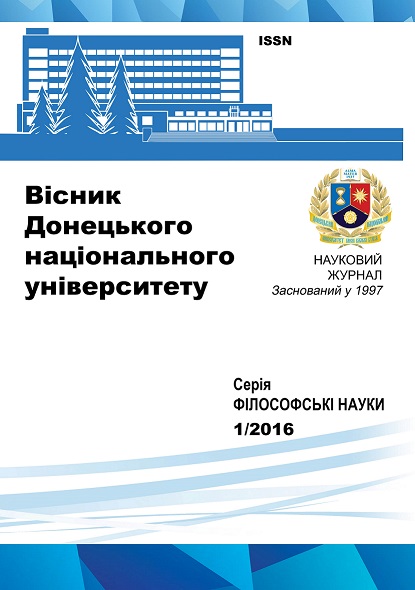About the Limits of Enlightenment Verbalism.
Keywords:
Enlightenment, mediation, verbalism, averbalism, word, textAbstract
This article is devoted to the mediating role of language in the space of the Enlightenment. The author draws on research by K. Siskin, W. Warner and O. Perepelitsa, who believe that the Enlightenment is a media phenomenon. O. Perepelitsa also argues that language is one of the main mediums of the Enlightenment, but does not clarify the conditions under which a language can perform the intermediary function. The author tries to fill up this gap. Using the comparative method, the author compares the European and Chinese Enlightenments and considers the teachings of Plato, Bacon, Locke, Freud, Confucius and Wang Yangming. The author argues that language is able to carry out their intermediary functions at a sufficiently high ontological status word and text. The high status of the word and the text has in China, where they mediate between man and Heaven. Language here connects people with higher levels of existence. Confucius is credited with the theory that the Chinese hieroglyphs are derived from the sacred symbols of Heaven and Earth. Wang Yangming asserts that the texts of the Confucian canon are the basis of everything. They are identical to the Tao and its manifestations. When these texts are identical to the manifestations of the Tao, they become intermediaries between the people and the highest levels of the ontological hierarchy. At the same time, when the unity between man and the first principles of being is achieved, language is no longer needed. At the higher levels of being silence reigns. Confucius said that he would not say anything, because the Heaven is silent, but still maintains the cosmic order. And Wang Yangming teaches that in every human heart there is Confucius, so spiritual continuity can be established without signs and texts. On the contrary, European thinkers constantly express suspicion that a word incorrectly reflects the essence of things, so the language should be cleaned and correct. The word for many of them does not have a high ontological status. Plato speaks of the discrepancy between the words and the essence of things. Bacon doubts that the language can be a mediator between the human mind and the divine ideas, which constitute the essence of things. According to Locke, the words are the signs that indicate human ideas. But the connection between the characters and ideas people set arbitrarily, so the language cannot be a good mediator. According to Freud, the true essence of man is rooted in the unconscious. It becomes apparent through misuse of words. Thus, in the universe of the Enlightenment the text and the word can lead a man to higher levels of existence, and can interfere with the movement to him. The higher ontological level, where are the word and the text, the better they are able to perform their intermediary functions. At the same time on the entity level, the status of which is greater than the status of the word and the text, the word and the text can no longer act.References
This Is Enlightenment / Ed. by Clifford Siskin and William Warner. – Chicago: The University of Chicago Press, 2010. – 505 p.
Перепелица О. Н. Медиумы просвещения: обсценные отклонения / О. Н. Перепелица. – Харьков: Харьковский национальный университет имени В. Н. Каразина, 2014. – 260 с.
Платон. Собрание сочинений в 4 т. / Платон; [пер. с древнегреч.]. – М.: Мысль, 1990–1994.
The Works of Francis Bacon, baron of Verulam, viscount St. Albans, and Lord High Chancellor of England / Francis Bacon; [collected and edited by J. Spedding, R. L. Ellis and D. D. Heath]. – Boston: Houghton, Mifflin and Company; Cambridge: The Riverside Press.
The Works of John Locke in ten volumes / John Locke. – London: Printed for Thomas Tegg; W. Sharpe and son; G. Offor; G. and J. Robinson; J. Evans and Co.: also R. Griffin and Co., Glasgow; and J. Cumming, Dublin, 1823.
Руткевич А. М. Психоанализ. Истоки и первые этапы развития: курс лекций / А. М. Руткевич. – М.: ИНФРА-М – ФОРУМ, 1997. – 352 с.
Лейбин В. М. Фрейд, психоанализ и современная западная философия / В. М. Лейбин. – М.: Политиздат, 1990. – 397 с.
Freud S. Vorlesungen zur Einführung in die Psychoanalyse. – [Electronic resource]. Mode of access to text: http://www.projekt.gutenberg.de/autor/182
Кобзев А. И. Философия китайского неоконфуцианства / А. И. Кобзев. – М.: Вост. лит., 2002. – 606 с.
Семененко И. И. Афоризмы Конфуция / И. И. Семененко. – М.: Изд- во МГУ, 1987. – 302 с.
Малявин В. В. Конфуций / В. В. Малявин. – М.: Мол. гвардия, 2007. – 357 с.
Луньюй (Изречения) / пер. с кит. И. И. Семененко // [Конфуций. Уроки мудрости]. – М. – Х.: ЭКСМО-Пресс – Фолио, 1999. – С. 17–126.
Ван Янмин. Запись о посвященном канонам зале библиотеки у горы [Гуй]цзи [1525 г.] / Ван Янмин; [пер. с кит. А. И. Кобзева] // [Кобзев А. И. Философия китайского неоконфуцианства]. – М.: Вост. лит., 2002. – С. 500–503.

